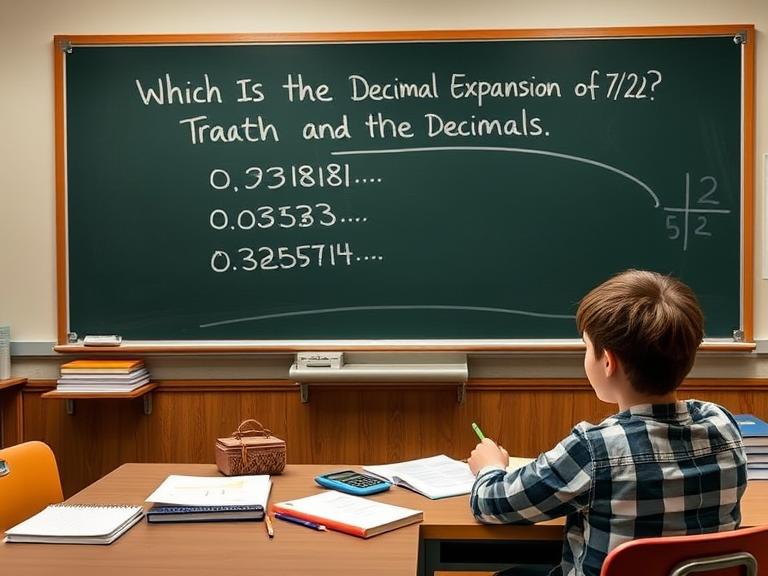Which Is the Decimal Expansion of 7/22? Decimal expansions represent fractions in base-10 form, either terminating (ending) or repeating (continuing infinitely). When converting a fraction like 7/22 to decimal form, we need to perform division and analyze the resulting pattern.
This article will:
- Show the step-by-step conversion of 7/22 to decimal form
- Explain whether it terminates or repeats
- Compare it to similar fractions
- Answer common FAQs about decimal expansions
Table of Contents
Calculating 7/22 as a Decimal
To find the decimal expansion of 7/22, we perform long division:
Step-by-Step Division: 7 ÷ 22
- 22 goes into 7 zero times, so we write 0. and add a decimal + zero: 7.0
- 22 into 70:
- 22 × 3 = 66
- Subtract: 70 – 66 = 4
- Write 0.3 and bring down another 0 → 40
- 22 into 40:
- 22 × 1 = 22
- Subtract: 40 – 22 = 18
- Write 0.31 and bring down 0 → 180
- 22 into 180:
- 22 × 8 = 176
- Subtract: 180 – 176 = 4
- Write 0.318 and bring down 0 → 40 (same as Step 2)
At this point, the remainder 4 repeats, causing the decimal to cycle indefinitely.
Final Decimal Expansion:
722=0.18‾227=0.18
(The “18” repeats infinitely.)
Why Does 7/22 Repeat?
A fraction’s decimal expansion terminates only if its denominator (after simplifying) has no prime factors other than 2 or 5.
- 22 factors into 2 × 11 → includes 11 (a prime ≠ 2 or 5).
- Thus, 7/22 must repeat.
Repeating vs. Terminating Decimals
| Fraction | Denominator Factors | Decimal Form |
|---|---|---|
| 7/22 | 2 × 11 | 0.3181818… (Repeating) |
| 7/20 | 2² × 5 | 0.35 (Terminating) |
| 1/3 | 3 | 0.\overline{3} (Repeating) |
How to Represent Repeating Decimals
- Bar notation: 0.18‾0.18 (the “18” repeats).
- Ellipses: 0.31818… (indicates ongoing repetition).
Applications of Repeating Decimals
- Precision in Calculations:
- For practical use, 722227 is often rounded (e.g., 0.318 or 0.3182).
- Mathematical Proofs:
- Repeating decimals confirm a fraction’s irrationality or rationality.
FAQs About 7/22 and Decimal Expansions
1. Is 7/22 a rational number?
Yes—it’s a ratio of integers with a repeating decimal.
2. How many digits repeat in 7/22?
The sequence “18” (2 digits) repeats after 0.3.
3. Can 7/22 be written as a terminating decimal?
No—its denominator contains a prime factor (11) other than 2 or 5.
4. What’s the decimal for 22/7?
227=3.142857‾722=3.142857

